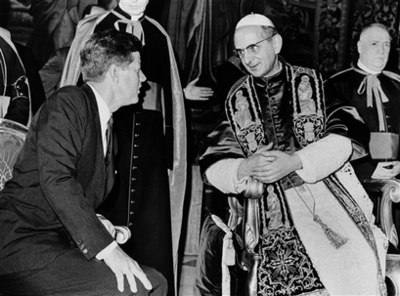While Pope Benedict voiced his revulsion at the sexual abuse scandal for the first time yesterday, it is important to understand that the genesis of his statements went back to a meeting that took place more than four years ago, not with other bishops, but with leaders of the lay review board set up to keep an eye on how the American hierarchy was complying with their own guidelines.
The National Lay Review Board, as it is known, had a rocky start, as the first head, former Oklahoma governor Frank Keating (now a Catholic advisor to John McCain) was sent packing after comparing the bishops to the Mafia–always a fast way to the bad side of the episcopacy.
A well-respected Chicago jurist, Anne Burke, was then named to lead the blue-ribbon panel of 13 lay leaders, and while she was more politic in public, she found it tough going as she tried to arrange meetings with various bishops about the issue. She got nowhere, and in frustration, Burke and other board members started calling and faxing various Vatican offices asking if they could fly over, at their own expense, to meet with them. A few offices responded, among them the Congregation for the Doctrine of the Faith, headed by Cardinal Joseph Raztinger.
In January 2004, Burke and several other board members met with Ratzinger and his aides in his offices, for a full two-and-a-half hours. They set out the scope and depth of the scandal, which Ratzinger (and other Vatican officials) said they had not known. The U.S. bishops, Burke said, weren’t giving the Vatican the full story. Ratzinger listened attentively, and at the end of the meeting stood up and promised the lay leaders he would get back to them. His time and response was something that one of the cardinal’s top aides told Burke was very unusual.
“Cardinal Ratzinger was far more open to meeting with members of the national review board than our own bishops and cardinals,” Burke later told Newsday. Burke said Ratzinger was very engaged in the topic, beyond the fact that his department was charged with dealing with most cases to determine whether a priest should be defrocked, or “laicized” in church terms. “He took in everything we had to say and answered our questions. And we pulled no punches: We told him what was going on in terms of the extent of the actual abuse by the priests and about our dismay with the U.S. church hierarchy.”
(It was also characteristic of Cardinal Ratzinger’s personal, pastoral solicitude that he wrote Burke a warm letter after her 30-year-old son was killed in a snowmobile accident the next month. “He had heard of the sad news of my son and he expressed his sorrow and condolences, and reminded us to have consolation in our faith,” Burke said. “It was a very, very beautiful note. I still have it.”)
Until then, Ratzinger had been one of the many bishops, especially at the Vatican, who defensively depicted the reports of abuse as exaggerated and overhyped creations of an American media industry that he viewed as inherently biased against the church.
After his meetings with Burke et al, he changed his tune. In delivering the Good Friday meditations in Rome a year later, he decried, in his characteristically Augustinian manner, the “filth in the church…even among those who, in the priesthood, ought to belong entirely to [Christ]”–a clear reference to abusive priests.
He also seemed to refer to the priesthood when he said: “The soiled garments and face of your church throw us into confusion. Yet it is we ourselves who have soiled them! It is we who betray you time and time again.” That echoes a comment he blurted to a fellow bishop earlier that year, when they were talking about the scandal and the Cardinal said, intensely, “It is we priests, us, we must stop this!”
Ratzinger also took steps to accelerate the process for laicizing offending clerics. In fact, there was such a glut of cases and appeals by accused priests as a result of the tough new policy that at one point the CDF, which became the chief arbiter of the cases, reportedly had a backlog of some 700 cases.
He said nothing about the issue for the first three years of his pontificate. But when he broke his silence yesterday, his words were powerful perhaps because they were so long in the making.

